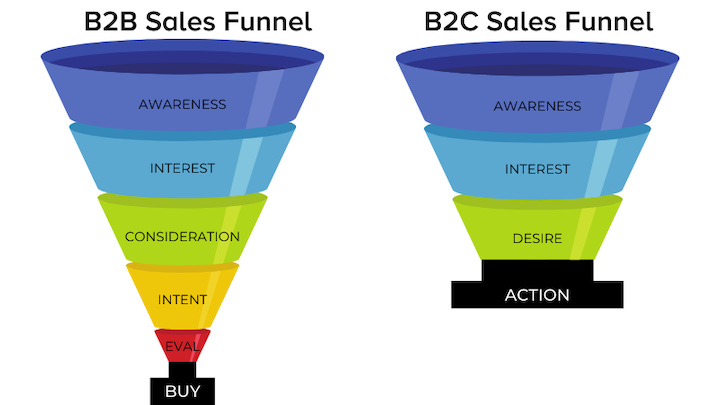💡Tech Marketing in B2B, B2C and B2B2C Companies
How Marketing in B2B, B2C and B2B2C tech companies vary.
In my last publication, I wrote about the various Marketing roles in Tech. The roles of Tech Marketers vary depending on whether the company operates a B2B model or a B2C model.
B2B and B2C companies have similar characteristics. However, marketing efforts for both companies differ because they focus on different target audience.
In today’s publication, we will discuss these differences and what to expect on your journey as a Tech Marketer.
Grab your popcorn🍿.
B2B Vs B2C Companies
B2B means Business to Business while B2C means Business to Customer. B2B companies provide services for other businesses. B2C companies provides services for customers. B2C Companies are sometimes referred to as D2C (Direct to Customer) companies.
Companies with the B2C model are mostly social media, gaming, hardware and e-commerce companies while B2B companies focus primarily on providing services to other businesses. Marketing efforts aimed at B2B customers are usually rationally driven. To convert a business, you must prove that your product can either reduce cost or improve efficiency. B2C marketing efforts on the other hand are mostly emotion driven.
Marketing efforts in B2C companies are geared towards generating leads. This means the customer showing interest in the product. B2C companies focus on promoting the brand to generate top of the mind awareness for the customers.
Differentiating between B2B and B2C Marketing Strategies
Like we discussed, B2B companies target businesses as their customers while B2C companies target consumers. In the same vein, Marketing efforts of both companies differ based on their target audience.
We will be differentiating between B2B and B2C companies using the following metrics:
Pricing
Customer Relationship
Onboarding
Website
Branding
Marketing/Sales Funnel
1. Pricing
B2B - Prices are given to customers based on the volume of the business and potential revenue from the business relationship.
B2C - All customers are given a single pricing tier.
2. Customer Relationship
B2B - The aim of marketing for B2B companies is to generate leads and convert them into repeat customers. To achieve this, long term relationships must be built with the customers.
Relationship Managers are employed in B2B companies to establish and manage relationships with the customers to ensure the company retains their position as a friend and authority to the clients.
B2C - B2C companies aim to drive users to their platform for repeated sales. They focus on getting customers to make as many purchases in the shortest possible time. Hence, the relationship with the customer is merely transactional.
B2C companies employ Customer Service teams that attends to issues that may arise in the course of the transaction.
3. Onboarding
B2B - B2B companies have a longer onboarding process for customers due to the number of people involved in the decision making process of the customer.
B2B customers are often slow in making purchase decisions. This is because of the volume of transactions and effect of the purchase decision on the company. The company must be adequately informed before making the decision.
B2C - B2C companies have a shorter onboarding process. The customers make emotionally driven decisions and oftentimes lack enough information about the product.
Also, onboarding processes for consumers need to be short to avoid drop offs.
4. Website
B2B - B2B websites are simply used as dashboards for information about the company’s products and make purchases.
B2C - B2C companies need to make sure their User Interface and User experience are compelling. Consumers have short attention span and as such, short and snapping messages are needed to catch their attention.
5. Branding
B2B - brands position themselves as authorities in a particular area
B2C - brands position themselves as friends of the consumer. Branding is more personalized with a message to the customers e.g. “Bank of the free“.
6. Marketing and Sales Funnel
B2B - longer sales funnel as the decision making process is long.
B2C - shorter sales funnel as consumer decision making process is short.

B2B2C Companies
B2B2C companies combine both B2B and B2C business models. These are companies that serve both businesses and consumers. Companies in this category would combine both marketing strategies of B2B and B2C companies to adequately position themselves for growth in the market.
Examples of businesses in this category include Shuttlers, Paystack, Fincra, Flutterwave, Opay, and Reliance HMO.
How does this affect the African Tech Ecosystem?
As the Nigerian and African tech ecosystem continues to grow, businesses continue to expand their product offerings to serve both businesses and customers. This is to mitigate the risks against unforeseen circumstances as well as diversify the revenue streams of the company.
As such, it is important that Tech Marketers are well equipped with the necessary B2B, B2C and B2B2C marketing skills.
Resources
